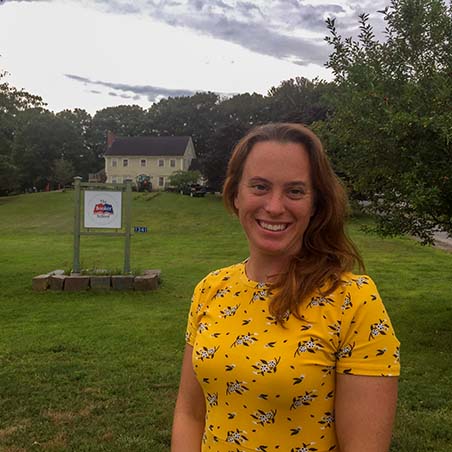Temma Frecker
Middle School Teacher and Curriculum Coordinator: The Booker School in Port Williams, NS
Bachelor of Arts (Hons), International Development Studies and Spanish, 2001
Everything is taught through the idea of trying to get a deeper understanding of a big concept.
Temma Frecker is pretty clear about her teaching philosophy.
She says, “Empowerment is foundational for me—giving the students the tools and the confidence to help them delve into whatever is important to them.”
It’s a philosophy and a teaching style that won Temma the 2018 Governor General’s History Award for Excellence in Teaching.
Temma teaches middle school at The Booker School in Port Williams, Nova Scotia. It’s a non-profit independent school started by Johanna Mercer. Temma met her by chance.
“I thought I would be a high school teacher. But there was a woman and her son handing out pamphlets at the Wolfville Farmers Market for a school they wanted to start. The woman was Johanna Mercer. I talked to them. And I began tutoring her son in Spanish. When the school became a reality, I was the first teacher they hired.”
She brought her King’s experience to her new school.
“In the Foundation Year Program (FYP) we had to read many different texts. We learned how to make so many connections between things that you see in your day to day living, across subjects and interest areas. It’s the way we teach at The Booker School. It’s called trans-disciplinary. Everything is taught through the idea of trying to get a deeper understanding of a big concept. You don’t separate your subjects. That’s what we did at King’s.”
It took Temma a few years after graduating to get into teaching. She was an intern on Parliament Hill in Ottawa. She worked for NGOs across Canada and in Mexico and Honduras.
“Many of the projects had to do with education in some way. When I was thinking about coming back home and putting down roots, teaching seemed like a good idea.”
After getting her BEd, Temma and her husband, also a teacher, spent a year in Nunavik in an isolated fly-in community.
“It was really challenging,” she says. “Education isn’t necessarily a huge priority there, so I had to make it relevant to develop trust and keep the students coming back.”
Relevancy is key to why Temma won that national teaching award. She was completing a unit on Canada 150, examining it from all angles. At the same time there was an emotional debate going on in Halifax over what to do with the statue of Edward Cornwallis. He is called the founder of Halifax, but for many Mi’kmaq, his statue represents injustices and violence against indigenous people. They wanted it removed.
“As a teacher I saw this as a golden opportunity. I didn’t have the answers. I didn’t know the best way forward, so I thought—I’ll just put it to the students.”
The students came up with an elegant solution to incorporate the statue with other statues, such as one of Chief John Denny Jr. He was the last of Mi’kmaq hereditary grand chiefs. Another possibility—Viola Desmond, a beacon in the fight for racial equality. The statues would be facing each other as if in conversation. The idea is to bring a larger perspective to Halifax history. The media got hold of it and Temma and the students were besieged by interview requests. All that led to the award.
Temma, with true humility, deflects any personal kudos. “It shows the education at Booker is a really legitimate and powerful educational experience.”
She also credits her students who tackled the assignment in a typically King’s-ian way, with positions and debate and discussion.
As part of the assignment the students had to write reflections on what they had experienced. One grade 6 student wrote—“If you want change to happen, you have to try to make it happen.”
That’s what empowerment looks like.
Posted: September 2019
